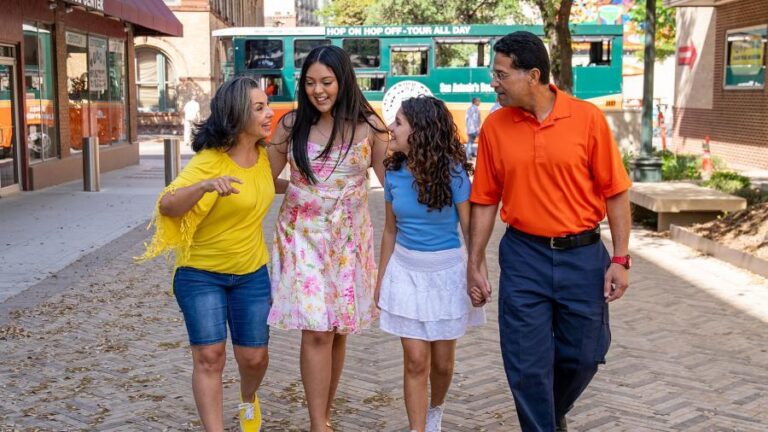Bridging the Political Rift: Healing San Antonio’s Families and Communities
How Political Polarization is Reshaping San Antonio’s Social Landscape
In San Antonio, Texas, the widening political divide is increasingly influencing everyday interactions, fracturing relationships that once thrived on mutual respect and shared community values. Disagreements over pivotal topics such as immigration policies, educational reforms, and municipal governance have seeped into family discussions and neighborhood conversations, creating tension and eroding long-standing bonds. This polarization extends beyond mere ideological differences, manifesting in emotional strain and social fragmentation that threaten the support networks vital to many households.
Recognizing the urgency of this issue, various community leaders and grassroots groups have initiated efforts aimed at fostering dialogue that transcends partisan lines. These endeavors focus on:
- Facilitated Listening Circles designed to cultivate empathy and mutual understanding
- Workshops on Media Literacy and Civil Discourse to equip residents with tools for respectful communication
- Joint Community Projects that bring together diverse groups to collaborate on shared objectives
While these initiatives offer promising avenues for reconciliation, their effectiveness hinges on participants’ willingness to engage openly and reject divisive rhetoric. Rebuilding trust is a gradual process but remains essential for the social resilience of San Antonio’s families.
Decoding the Underlying Drivers of Political Division in San Antonio
The political fragmentation observed in San Antonio mirrors a broader national trend, fueled by a complex interplay of economic, cultural, and informational factors. Economic disparities have intensified as certain neighborhoods experience rapid development while others face neglect, fostering feelings of exclusion and resentment. Cultural shifts and demographic changes have also contributed to tensions, as communities grapple with evolving identities and competing priorities on issues like public safety and education.
Moreover, the fragmented media environment exacerbates polarization. Algorithms on social platforms often prioritize sensational content, reinforcing ideological echo chambers and limiting exposure to diverse perspectives. This media landscape, combined with declining civic participation and growing skepticism toward institutions, deepens the divide.
Key contributors to this polarization include:
- Economic Disparities: Unequal resource distribution undermines social cohesion.
- Cultural and Identity Politics: Shifts in demographics spark debates over representation and values.
- Media Fragmentation: Sensationalism and misinformation fuel mistrust.
- Declining Civic Engagement: Reduced voter turnout and institutional distrust weaken democratic processes.
| Factor | Community Impact |
|---|---|
| Economic Inequality | Heightened tensions and social fragmentation in underserved neighborhoods |
| Cultural Polarization | Conflicts over local policies and community identity |
| Media Influence | Spread of misinformation and reinforcement of partisan divides |
| Civic Disengagement | Lower participation in democratic processes and diminished accountability |
Grassroots Movements and Cultural Programs Healing Divides
Across San Antonio, a wave of community-driven initiatives is emerging to mend the fractures caused by political discord. These programs prioritize shared human experiences and collective problem-solving over partisan identities. For example, the “Conversations Across Borders” series hosts weekly moderated dialogues where residents from varied political backgrounds discuss pressing local issues such as neighborhood safety, education, and urban development. These forums have successfully attracted hundreds of participants, fostering empathy and reducing hostility.
Complementing these discussions, cultural exchange projects like “Heritage Harmonies” celebrate the city’s rich diversity through collaborative art, music, and storytelling workshops. These activities encourage interaction between groups historically divided by political and ethnic lines, promoting mutual respect and understanding. Recent data from 2023 highlights the positive impact of these programs:
| Program | Participants (2023) | Positive Feedback (%) | Reported Growth in Understanding (%) |
|---|---|---|---|
| Conversations Across Borders | 480 | 89% | 81% |
| Heritage Harmonies | 350 | 93% | 88% |
- Collaborative mural projects: Visual art initiatives that symbolize community unity.
- Interfaith gatherings: Events fostering spiritual and cultural connections.
- Community potlucks: Shared meals designed to break down social barriers.
These creative and conversational platforms are vital in nurturing a sense of belonging and healing within a city challenged by political fragmentation. By creating spaces where stories and experiences transcend political affiliations, San Antonio is laying the groundwork for renewed family and community cohesion.
Strategic Policy Measures to Rebuild Trust and Unity
To effectively address the political rifts, San Antonio’s leaders must adopt a comprehensive strategy centered on inclusivity and transparent communication. Prioritizing community engagement through open forums and listening sessions can provide safe environments for diverse voices to be heard and respected. Expanding educational programs focused on civic participation and critical media consumption will empower residents to navigate information responsibly, reducing the spread of misinformation.
Additionally, fostering initiatives that encourage cross-cultural and intergenerational collaboration can highlight shared values and histories, bridging divides. Recommended policy actions include:
- Boosting funding for neighborhood-led collaboration projects to encourage collective problem-solving
- Implementing transparent communication protocols within city governance to restore public confidence
- Supporting independent local journalism that focuses on community narratives rather than partisan agendas
- Introducing restorative justice programs to address social grievances constructively
| Policy Initiative | Anticipated Benefit |
|---|---|
| Community Forums | Enhanced empathy and open dialogue |
| Media Literacy Education | Reduction in misinformation and polarization |
| Neighborhood Collaboration | Strengthened local relationships and trust |
| Restorative Justice | Healing of community divisions and social wounds |
Restoring trust is a long-term endeavor requiring consistent dedication from policymakers and community members alike. Leaders must exemplify transparency and accountability, ensuring that governance reflects the city’s commitment to unity. By fostering an environment where disagreement is viewed as an opportunity for growth rather than division, San Antonio can cultivate a political culture that reinforces family bonds and community solidarity.
Conclusion: Rekindling Unity Amidst Political Differences
As political polarization deepens, San Antonio’s families face the challenge of overcoming ideological rifts that threaten their cohesion. The journey toward healing demands renewed emphasis on empathy, open communication, and active community participation-principles that have long defined the city’s resilient spirit. Though complex, this path offers hope that by prioritizing shared concerns over partisan divides, San Antonio can restore the unity at the core of its vibrant communities.




